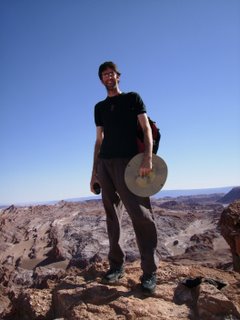

The spray can is gone. The flattened blackened can that was one piece of garbage that hadn't moved from its ever-increasingly familiar spot at the end of his street since the day he arrived. The can that he looked for and found each of the days since (as if a salve for his emotional wounds, even though he couldn't for the retched life of him think of why that can, of all things, represented his daily salvation) was now no longer part of his life. It panicked him at first, one rare constant in his life unexpectedly scooped up and vanished. Then it saddened him. But he got over it.
The spray can, having long lost it's shiny visage (it was black with rusty, muddy, aged shit) was simply rubbish, a daily struggle for people here, or maybe just for him. He walked past a well dressed gentleman in a Hummer sucking out the hardboiled lolly from it's wrapper and he noted that the man didn't seem to be struggling for the window as he also didn't struggle to let the wrapper go and ignore it falling to the street. The number 35 bus passes and two people from either end of its cabin, one skinny young school boy, one old Chola woman, respectively toss out a Chicolac chocolate milk package and a number of very large, perhaps chicken-soaked napkins. He swears quite audibly in English, feeling the swirl of ethical issues violently masticate and swallow his staunch judgement toward ignorant litterbugs, again. And then realises that this judgement is familiar to many of his friends he left back in the land where lightning cracks over canefields and figures, in total self-absorbment, if his damnation is good enough for Australians then it's good enough for Bolivians.
Sitting in the Plaza Catorce de Septiembre, the spirit of revolt filtering through his bent nostrils (feeling more bent in this altitude after returning from the lowland jungles of the Chapare), he gleefully waits for something. He's not sure what. The last time he sat on one of the wooden benches getting his kicks from the Michael Jackson impersonator, he was accosted by a god-fearin' converter. Of course he couldn't be converted, but they enjoyed themselves, he practicing his religious Spanish (it dawns on him that "they" all have exactly the same vocabulary size, with exactly the same words), the converter walking away feeling that perhaps he'd planted a seed. He had, but on fallow ground. That's not true: his mind, body and soul had been fertile since he began his involvement with Red Tinku, an international voice of the Bolivian indigenous. Among other things he teaches Revolutionary English to the willing, of which there are many, keen to broaden their circles of rebellion. He first came across the group when he saw the inspirational information placades six months ago in the plaza where he now sits. The placades are usually crowded by readers of the days events; newspapers, public notices, promotion for Red Tinku Tours (the alternative city tour). He looks at the placades now and is proud to see his name there, but feels the pressure of having to teach both English and Quechuan (see first pic)!
So then, he's been here for 6 months now. A worthy effort, and realises it's a little more than six months since he left the bloodwoods and the desert oak (o.k. he's never seen either) and it's a month where the first Friday of the month lands late. Normally he celebrates his achievement at the K'oa ritual, silently acknowledging his own special presence along with the hundreds of revellers dancing the traditional dance, playing the traditional instruments, sucking on the traditional coca leaves and drinking the traditional Chicha (his favourite tradition, as it turns out). His reverie is disrupted when he pops down a narrow side street from Calle Ayacucho and is caught face-to-face with another show of military might as rifle-clad performers stomp more or less in unison toward his ever thinning, weakening body. He survives, laughing nervously, reminded that there is a protest to happen at lunchtime today - it started by just involving teachers and engineers perhaps, he can't remember who, city people. So there shouldn't be much disruption. Perhaps half an hour. But then he hears that farmers are coming in from the country. Not so easy for the car-less. And from much further afield than the local school. It might be pretty big afterall. He doesn't know why they're protesting and he should hang around to find out, but he's got English classes and those $10B almuerzo meals won't pay for themselves. He reflects on the fact that at least with military street performances you always get either marching girls or Caporales (see second pic).
Six months has flown by for him and he finds himself having changed. He now:
a) can communicate his desires to the masses
b) falls into regular patterns where somedays he'll even glance past the glorious surrounding hills, the towering Cristo or the determined and inspiriational woman in black on the bridge, all now devoid of the spray-can shiny visage of touristy exoticicm, and looking for other, more mundane but specific landmarks
c) can eat, walk through, touch and hardly smell the things that used to want to make him puke
d) feels like he'll be crying like a baby when he leaves, the way he was six months earlier in Melbourne

2 comments:
Seis meses pasan muy rapido, te dije que poco a poco la vida en Cochabamba seria mas agradable, luego te dara pena cuando sea momento de partir.
Nos vemos pronto
"c) can eat, walk through, touch and hardly smell the things that used to want to make him puke"
Yeah, um, sorry I left those stenches in those bedrooms you took over but reading that thing above, I realise that it's no longer an issue. You've put my mind at ease!
Post a Comment